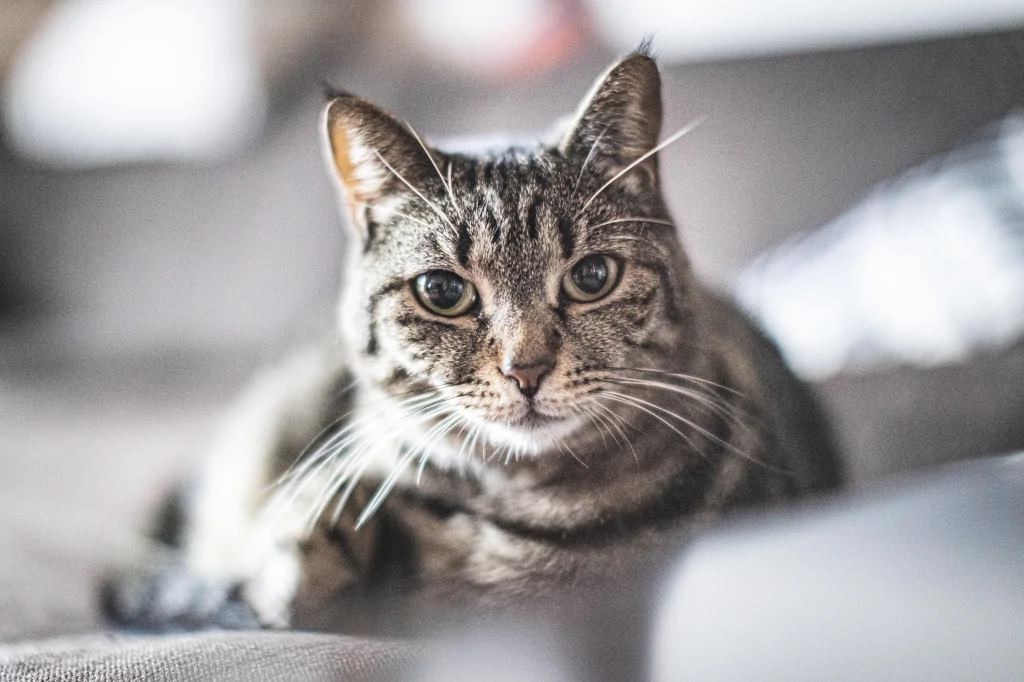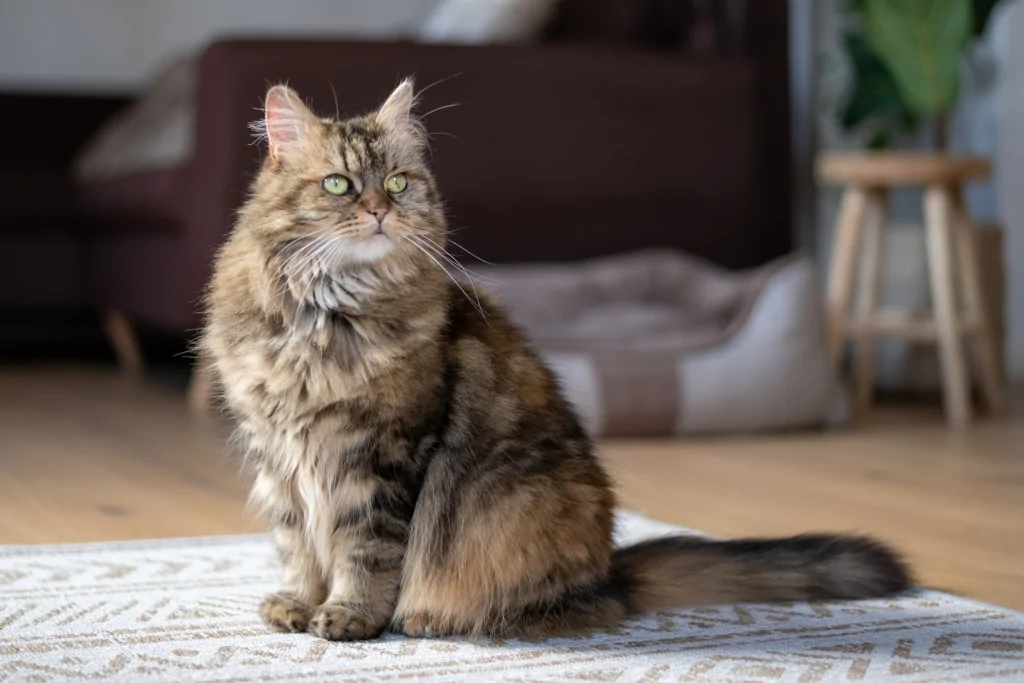Disclosure: We may earn a commission from helpful, relevant links in our content. No cost to you. See our privacy policy.
As our feline companions enter their golden years, their needs change, and it’s our responsibility as loving cat parents to adapt and support them through this new phase of life.
From ensuring they receive the proper nutrition to making their living environment more accessible, taking care of an older cat requires a unique approach.
With a few adjustments, you can help your furry friend continue to thrive and enjoy their senior years in comfort and style. This blog post will guide you in this and offer practical and useful advice on caring for your senior feline friend.

What Makes Senior Cat Care Different From Younger Cats?
Senior cats have different needs compared to their younger counterparts. As they age, their metabolism slows down, their mobility may decrease, and they might develop age-related health issues.
Their senses, such as hearing and vision, can also decline, making it essential to adjust their environment to accommodate these changes.
Additionally, senior cats may require more frequent vet visits to monitor and manage potential health concerns.
As responsible cat owners, it’s crucial to understand these differences and make the necessary adjustments to provide the best care for our aging feline friends.
Diet and Nutrition: Meeting the Needs of Aging Cats
As your feline friend enters their golden years, it’s crucial to understand how their dietary needs evolve to ensure they maintain optimal health. In this section, we’ll explore the essential aspects of diet and nutrition for senior cats, providing practical tips to help you make informed choices.
Choose the Right Food
Selecting the appropriate food is essential for your senior cat’s well-being.
Look for food specifically formulated for senior cats, as these often contain fewer calories and higher levels of nutrients that support their changing needs.
Consider trying:
Both of these options are tailored for senior cats, providing a balanced blend of nutrients to support their overall health and vitality as they age.
In addition to selecting appropriate food, consider the texture of the food as some senior cats may experience dental issues or have a harder time chewing. Wet food or moistening dry kibble with warm water can make it more palatable and easier to consume for older cats.
Consult your veterinarian for personalized recommendations based on your cat’s age, weight, and health conditions.
Monitor Portion Sizes
As your cat’s metabolism slows down, it’s important to avoid overfeeding, which can lead to obesity and related health issues.
Measure out your cat’s food according to the feeding guidelines on the packaging or your vet’s recommendations. Be mindful of treats as well, ensuring they don’t exceed 10% of your cat’s daily caloric intake.
To help maintain a healthy weight, introduce regular feeding times instead of free-feeding your senior cat. This allows you to monitor their food intake more accurately and adjust portions as needed based on their activity level and weight changes.
Consider Supplements
Some senior cats may benefit from nutritional supplements to support their joint health, digestion, or other age-related concerns.
For instance, a popular supplement to support senior cats’ joint health is fish oil, which contains omega-3 fatty acids known for their anti-inflammatory properties. Consider Nordic Naturals Omega-3 Pet, which is a reputable product that many cat owners have found beneficial.
However, always consult with your veterinarian before introducing any new supplements to ensure they’re appropriate and safe for your specific cat’s needs.
Monitor and Adjust
Regularly observe your senior cat’s eating habits, body condition, and weight. If you notice changes such as weight gain or loss, a decline in appetite, or difficulty eating, consult your veterinarian.
They can help determine if any adjustments need to be made to your cat’s diet or if there are underlying health issues that require attention.

Exercise and Play: Keeping Your Senior Cat Active
Age may bring wisdom, but it shouldn’t mean an end to playtime. Discover how to adapt your cat’s exercise routine to their golden years, keeping them healthy and happy every step of the way.
Adjusting Playtime Activities
Senior cats may not have the same energy levels as their younger counterparts, but they still need regular play and stimulation.
Opt for low-impact activities such as gentle wand toys or soft balls (like these) that allow your cat to engage in play without straining their joints.
Be mindful of your cat’s physical limits and adjust the intensity and duration of playtime accordingly.
Create a Cat-Friendly Environment
Make it easy for your senior cat to stay active by providing them with a comfortable and engaging environment.
Include multiple levels of perches, scratching posts, and cozy resting spots that encourage movement and exploration. Browse these cat trees for senior cats, and you’ll find lots of great options that are specifically created with your cat’s age in mind.
Be sure to place these items in accessible locations, taking into consideration any mobility issues your cat may have.
Encourage Mental Stimulation
Keeping your senior cat’s mind sharp is just as important as physical activity. Offer puzzle toys or food-dispensing toys that challenge your cat’s problem-solving skills.
Introducing new toys or rotating them regularly can also help maintain your cat’s interest and prevent boredom. It will also provide the necessary mental stimulation and enrichment every cat needs.
Maintain a Routine
You probably know about this by now, but it bears repeating: Establishing a consistent routine for play and exercise is highly beneficial for all cats, including senior cats.
This helps them know what to expect, which can reduce stress and anxiety. Just keep in mind that your cat’s stamina may decrease as they age, so be prepared to modify the routine to accommodate their changing needs.
Remember to always monitor your cat during play and exercise, stopping if they show signs of discomfort or fatigue.
Regular Vet Visits: Monitoring Your Senior Cat’s Health
Our feline companions may age gracefully, but they still need a watchful eye. Learn how regular vet visits can make all the difference in your senior cat’s health and well-being.
Increased Frequency of Check-ups
As your cat ages, it’s essential to schedule more frequent veterinary check-ups to monitor their health.
Senior cats should visit the vet at least twice a year, compared to annual visits for younger cats. This allows your vet to detect any potential health issues early and provide appropriate treatment or management plans.
Preventative Care for Senior Cats
Preventative care is crucial for maintaining your senior cat’s health.
During check-ups, your vet will likely recommend vaccinations tailored to senior cats, dental cleanings, and routine blood work to identify potential health concerns such as kidney disease, diabetes, or thyroid issues.
Regular preventative care can help extend your cat’s life and improve their overall quality of life.
Discussing Nutritional Needs
As your cat ages, their dietary requirements may change. It’s essential to discuss these changes with your vet, who can recommend the best type of food, supplements, or portion sizes for your senior cat.
Your vet will take into consideration any existing health conditions, weight management needs, or other factors when making recommendations.
Monitoring Behavioral Changes
Senior cats may exhibit changes in behavior, which could be indicative of underlying health issues.
During regular vet visits, discuss any new behaviors, such as increased vocalization, changes in litter box habits, or decreased social interaction. These insights can help your vet determine if further diagnostic testing or interventions are necessary.
If, by any chance, you’re looking to find a different vet, we have a guide on how to do it, and what to look for to avoid any pitfalls and choose the best vet for your senior feline friend.
Preparing for End-of-Life Care
While it’s a difficult topic to address, discussing end-of-life care options with your vet is important as your cat reaches their senior years.
By having these conversations early, you can make informed decisions about palliative care, pain management, and, when necessary, humane euthanasia.
This allows you to prepare for your senior cat’s final stages of life with a greater sense of peace and understanding.
Creating a Comfortable and Safe Environment for Your Senior Cat
As your cat enters their senior years, it’s important to create an environment that caters to their changing needs. Making some simple adjustments around your home can greatly improve their comfort and safety. Here’s what to keep in mind:
- Ease of Accessibility. Ensure that your senior cat can easily access their favorite spots, such as beds, litter boxes, and food and water bowls. For example, I noticed that my senior cat started having difficulty jumping onto her favorite windowsill. To help her, I placed a small step stool next to the windowsill, making it easier for her to reach her favorite perch.
- Comfortable Bedding. Senior cats may experience joint pain or stiffness due to arthritis. Providing comfortable and supportive bedding can help alleviate some of their discomfort. Memory foam or orthopedic beds can offer much-needed support for aging joints.
- Litter Box Adaptations. Consider switching to a litter box with lower sides or a ramp for easier access. This can be particularly helpful for cats with arthritis or mobility issues. This Kitty Go Here litter box can be a great choice. Your cat will thank you. Additionally, ensure the litter box is in a convenient location that’s easy for your senior cat to reach.
- Minimizing Slip Hazards. As cats age, their coordination and balance may decline. To help prevent slips or falls, place non-slip mats or rugs on slippery surfaces, such as hardwood or tile floors. This will provide better traction and help your senior cat feel more confident as they move around.
FAQs
At what age is a cat considered a senior?
Cats are generally considered seniors when they reach 10-12 years old, although this can vary depending on factors such as breed and individual health.
How can I make my home more senior-cat friendly?
To make your home more senior-cat friendly, provide easy access to essentials like food, water, and litter boxes, offer comfortable and supportive bedding, minimize slip hazards, and maintain a consistent environment.
Do senior cats need special supplements for joint health?
Senior cats may benefit from joint health supplements, such as glucosamine and chondroitin (available at Chewy and Amazon), to help alleviate arthritis symptoms. Consult your vet for specific recommendations based on your cat’s needs.
How often should I schedule vet visits for my senior cat?
Senior cats should have veterinary check-ups at least twice a year to monitor their health and address any age-related concerns promptly.
Alex, a passionate animal lover, has experience in training and understanding animal behavior. As a proud pet parent to two dogs and three cats, he founded AnimalReport.net to share insights from animal experts and expand his knowledge of the animal kingdom.




